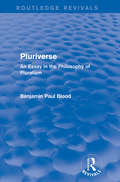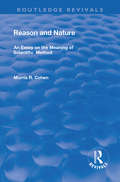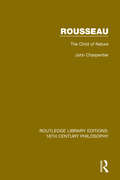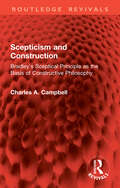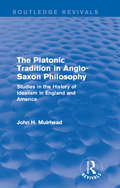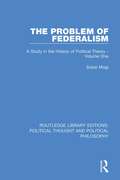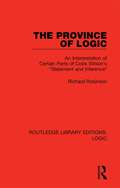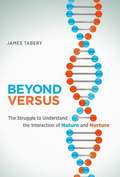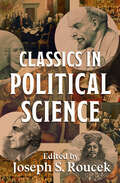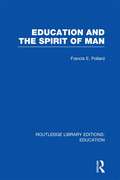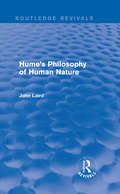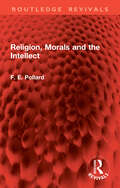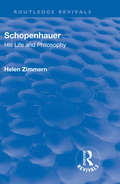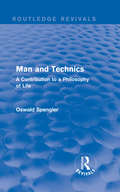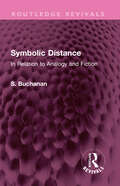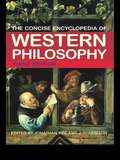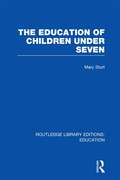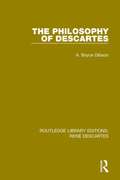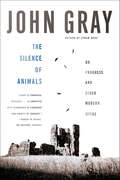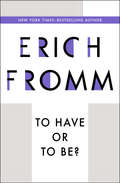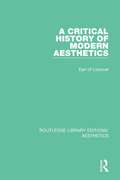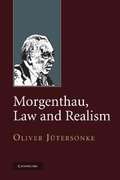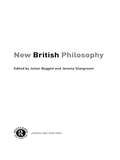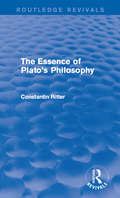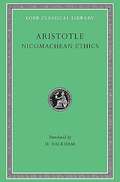- Table View
- List View
Pluriverse: An Essay in the Philosophy of Pluralism (Routledge Revivals)
by Benjamin Paul BloodPluriverse, the final work of the American poet and philosopher Benjamin Paul Blood, was published posthumously in 1920. After an experience of the anaesthetic nitrous oxide during a dental operation, Blood came to the conclusion that his mind had been opened, that he had undergone a mystical experience, and that he had come to a realisation of the true nature of reality. This title is the fullest exposition of Blood’s esoteric Christian philosophy-cum-theology, which, though deemed wildly eccentric by commentators both during his lifetime and later in the twentieth century, was nonetheless one of the most influential sources for American mystical-empiricism. In particular, Blood’s thought was a major inspiration for William James, and can be seen to prefigure the latter’s concept of Sciousness directly.
Reason and Nature: An Essay on the Meaning of Scientific Method (Routledge Revivals)
by Morris R. CohenFirst published in 1931, this volume represents the culmination of twenty years’ of the study on the principles of science. Noticing a widespread craving for philosophical light at a time of scant such offerings, Morris R. Cohen aimed to demonstrate here the fundamental and ancient connection between nature and science - between hearts and minds – in an attempt to salve the developing mutual hostility between the two in the 1920s. The volume bears particular relation to George Santayana’s Life of Reason and Bertrand Russell’s Principles of Mathematics and explores areas including the character of the insurgence against reason and reason in the contexts of the natural and social sciences.
Rousseau: The Child of Nature (Routledge Library Editions: 18th Century Philosophy #16)
by John CharpentierThis book, first published in 1931, provides a valuable account of Rousseau’s early years, giving an insight into his later philosophies, as well as showing the development of his thought.
Scepticism and Construction: Bradley's Sceptical Principle as the Basis of Constructive Philosophy (Routledge Revivals)
by Charles A. CampbellOriginally published in 1931, this book follows the sceptical principles of Bradley to their logical conclusions, pushing them even further than Bradley was willing to go. The argument selected as a starting point is the one used in Note A of the appendix to Appearance and Reality. The author argues for a return to the position of Kant, and opposes the central conception of Absolute Idealism, arguing for a metaphysical scepticism.
The Platonic Tradition in Anglo-Saxon Philosophy: Studies in the History of Idealism in England and America (Routledge Revivals)
by John H. MuirheadOriginally published in 1931, Muirhead’s study aims to challenge the view that Locke’s empiricism is the main philosophical thought to come out of England, suggesting that the Platonic tradition is much more prominent. These views are explored in detail in this text as well as touching on its development in the nineteenth century from Coleridge to Bradley and discussions on Transcendentalism in the United States. This title will be of interest to students of Philosophy.
The Problem of Federalism: A Study in the History of Political Theory - Volume One (Routledge Library Editions: Political Thought and Political Philosophy #42)
by Sobei MogiFirst published in 1931. The Problem of Federalism provides a comprehensive and critical survey of the historical development and practical application of the idea of federalism as a form of state organisation. The author explores federal ideas from the eighteenth- up until the early twentieth-century. This extensive study will be useful to students of politics and philosophy.
The Province of Logic: An Interpretation of Certain Parts of Cook Wilson's “Statement and Inference” (Routledge Library Editions: Logic)
by Richard RobinsonOriginally published in 1931. This inquiry investigates and develops John Cook Wilson’s view of the province of logic. It bases the study on the posthumous collected papers Statement and Inference. The author seeks to answer questions on the nature of logic using Cook Wilson’s thought. The chapters introduce and consider topics from metaphysics to grammar and from psychology to knowledge. An early conception of logic in the sciences and presenting the work of an important twentieth century philosopher, this is an engaging work.
Beyond Versus
by James TaberyIf everyone now agrees that human traits arise not from nature or nurture but from the interaction of nature and nurture, why does the "nature versus nurture" debate persist? In Beyond Versus, James Tabery argues that the persistence stems from a century-long struggle to understand the interaction of nature and nurture -- a struggle to define what the interaction of nature and nurture is, how it should be investigated, and what counts as evidence for it. Tabery examines past episodes in the nature versus nurture debates, offers a contemporary philosophical perspective on them, and considers the future of research on the interaction of nature and nurture. From the eugenics controversy of the 1930s and the race and IQ controversy of the 1970s to the twenty-first-century debate over the causes of depression, Tabery argues, the polarization in these discussions can be attributed to what he calls an "explanatory divide" -- a disagreement over how explanation works in science, which in turn has created two very different concepts of interaction. Drawing on recent developments in the philosophy of science, Tabery offers a way to bridge this explanatory divide and these different concepts integratively. Looking to the future, Tabery evaluates the ethical issues that surround genetic testing for genes implicated in interactions of nature and nurture, pointing to what the future does (and does not) hold for a science that continues to make headlines and raise controversy.
Classics in Political Science
by Joseph S. RoucekThis anthology collects some of the most significant writings on politics and political science from some of history&’s greatest minds. In Classics in Political Science, editor Joseph S. Roucek guides readers through the ages of political thought and theory with arguments and essays by such groundbreaking theorists as Thomas Hobbes, Nicolai Lenin, Montesquieu, Jean-Jacques Rousseau, and many others. The selections range from ancient philosophers and statesmen, such as Cicero and Aristotle, to major figures of the twentieth century, such as Gandhi and Winston Churchill.
Education and the Spirit of Man (Routledge Library Editions: Education #151)
by Francis PollardThis volume was the Swarthmore Lecture for 1932, one of an annual series of lectures delivered by and for members of the Society of Friends (Quakers). The lecture discusses the place of education and moral philosophy in the world of the early twentieth century, as well as the place of religious discipline in education.
Hume's Philosophy of Human Nature (Routledge Revivals)
by John LairdThe essence of Hume’s eighteenth-century philosophy was that all the sciences were ‘dependent on the science of man’, and that the foundations of any such science need to rest on experience and observation. This title, first published in 1932, examines in detail how Hume interpreted ‘the science of man’ and how he applied his experimental methodology to humankind’s understanding, passions, social duties, economic activities, religious beliefs and secular history throughout his career. Particular attention is paid to the English, French and Latin sources that shaped Hume’s theories. This is a full and fascinating title, of particular relevance to students with an interest in the philosophy of Hume specifically, as well as the philosophy of human nature and the methodologies applied to its study more generally.
Religion, Morals and the Intellect (Routledge Revivals)
by F. E. PollardOriginally published in 1932, and therefore inevitably of its time, this book discusses the place of the intellect as a guide to religious truth. The author's work brought principles from Quaker decision-making to bear on wider questions about democracy and religion. The author affirms that the ‘Light Within’, although a personal endowment is not independent of the historical fact that spiritual geniuses in bygone ages have seen and testified and lived.
Revival: His Life And His Philosophy (Routledge Revivals)
by Helen ZimmernIn the following pages are outlined the Life and Philosophy of one of the most original and picturesque intellectual giants of our age. For while Schopenhauer offers marked analogies to Johnson, Rousseau and Byron, and yields in interest to none of them, he was at the same time a man of absolutely unique mould.
Routledge Revivals (1932): A Contribution to a Philosophy of Life
by Oswald SpenglerFirst published in 1932, this book, based on an address delivered in 1931, presents a concise and lucid summary of the philosophy of the author of The Decline of the West, Oswald Spengler. It was his conviction that the technical age — the culture of the machine age — which man had created in virtue of his unique capacity for individual as well as racial technique, had already reached its peak, and that the future held only catastrophe. He argued it lacked progressive cultural life and instead was dominated by a lust for power and possession. The triumph of the machine led to mass regimentation rather than fewer workers and less work — spelling the doom of Western civilization.
Symbolic Distance: In Relation to Analogy and Fiction (Routledge Revivals)
by S. BuchananFirst Published in 1932 Symbolic Distance presents the grammatical account of the structure of symbols and the description of the field within which fictions arise. The author argues that it seems improbable that distance should become an exact technical term in art criticism as long as the divorce between works of art and symbols is maintained. The book discusses important themes such as the analysis of fictions, genesis of fictions, and reduction of fictions. This is an interesting read for students of English literature.
The Concise Encyclopedia of Western Philosophy
by J. O. Urmson Jonathan RéeOn its first appearance in 1960, the Concise Encyclopedia of Western Philosophy established itself as a classic; this third edition builds on its original strengths but brings it completely up to date. The Concise Encyclopedia offers a lively, readable, comprehensive and authoritative treatment of Western philosophy as a whole, incorporating scintillating articles by many leading philosophical authors. It serves not only as a convenient reference work, but also as an engaging introduction to philosophy.
The Education of Children Under Seven (Routledge Library Editions: Education)
by Mary SturtThis book does not cover the whole field of Infants’ Teaching but is concerned mainly with general principles and matters which are open to the non-specialist. Some technical subjects such as Physical Education have been omitted but nonetheless the volume provides a thorough (if somewhat dated) introduction to early years education in the first half of the twentieth century.
The Philosophy of Descartes (Routledge Library Editions: Rene Descartes #2)
by A. Boyce GibsonMaintaining that it is impossible to understand the work of a philosopher without understanding the previous history of thought and the contemporaneous developments, this book, originally published in 1932, is an in-depth study of Descartes’ philosophy with a strong emphasis on the historical approach. It covers Descartes’ early life and education, before continuing to discuss his method of doubt, the existence of God, the scientific interpretation of nature, the unity of knowledge, the attributes of God and free-will.
The Silence of Animals: On Progress and Other Modern Myths
by John GrayA searching, captivating look at the persistence of myth in our modern world"By nature volatile and discordant, the human animal looks to silence for relief from being itself while other creatures enjoy silence as their birthright."In a book by turns chilling and beautiful, John Gray continues the thinking that made his Straw Dogs such a cult classic. Gray draws on an extraordinary array of memoirs, poems, fiction, and philosophy to re-imagine our place in the world. Writers as varied as Ballard, Borges, Conrad, and Freud have been mesmerized by forms of human extremity—experiences that are on the outer edge of the possible or that tip into fantasy and myth. What happens to us when we starve, when we fight, when we are imprisoned? And how do our imaginations leap into worlds way beyond our real experiences?The Silence of Animals is consistently fascinating, filled with unforgettable images and a delight in the conundrum of human existence—an existence that we decorate with countless myths and ideas, where we twist and turn to avoid acknowledging that we too are animals, separated from the others perhaps only by our self-conceit. In the Babel we have created for ourselves, it is the silence of animals that both reproaches and bewitches us.
To Have or To Be? (Bloomsbury Revelations Series)
by Erich FrommFrom the legendary psychoanalyst who wrote The Art of Loving and Escape from Freedom: A profound critique of materialism in favor of living with meaning. Life in the modern age began when people no longer lived at the mercy of nature and instead took control of it. We planted crops so we didn&’t have to forage, and produced planes, trains, and cars for transport. With televisions and computers, we don&’t have to leave home to see the world. Somewhere in that process, the natural tendency of humankind went from one of being and of practicing our own human abilities and powers, to one of having by possessing objects and using tools that replace our own powers to think, feel, and act independently. Fromm argues that positive change—both social and economic—will come from being, loving, and sharing. This ebook features an illustrated biography of Erich Fromm including rare images and never-before-seen documents from the author&’s estate.
A Critical History of Modern Aesthetics (Routledge Library Editions: Aesthetics #3)
by Earl of ListowelFirst published in 1933. The purpose of this work was to bridge a gap in English philosophical literature by completing the elaborate history of Bosanquet and to stimulate and enrich the whole study of aesthetics by means of his personal destructive and constructive criticism. This title will be of interest to students of philosophy.
Morgenthau, Law and Realism
by Oliver JütersonkeAlthough widely regarded as the 'founding father' of realism in International Relations, this book argues that Hans J. Morgenthau's legal background has largely been neglected in discussions of his place in the 'canon' of IR theory. Morgenthau was a legal scholar of German-Jewish origins who arrived in the United States in 1938. He went on to become a distinguished professor of Political Science and a prominent public intellectual. Rather than locate Morgenthau's intellectual heritage in the German tradition of Realpolitik, this book demonstrates how many of his central ideas and concepts stem from European and American legal debates of the 1920s and 30s. This is an ambitious attempt to recast the debate on Morgenthau and will appeal to IR scholars interested in the history of realism as well as international lawyers engaged in debates regarding the relationship between law and politics, and the history of international law.
New British Philosophy: The Interviews
by Jeremy Stangroom Julian BagganiFrom popular introductions to biographies and television programmes, philosophy is everywhere. Many people even want to be philosophers, usually in the café or the pub. But what do real philosophers do? What are the big philosophical issues of today? Why do they matter? How did some our best philosophers get into philosophy in the first place?Read New British Philosophy and find out for the first time. Clear, engaging and designed for a general audience, sixteen fascinating interviews with some of the top philosophers from the new generation of the subject's leaders range from music to the mind and feminism to the future of philosophy.Each interview is introduced and conducted by Julian Baggini and Jeremy Stangroom of The Philosophers Magazine. This is a unique snapshot of philosophy in Great Britain today and includes interviews with:Ray Monk - Biography; Nigel Warburton - the Public; Aaron Ridley - Music; Jonathan Wolff - Politics; Roger Crisp - Ethics; Rae Langton - Pornography; Miranda Fricker - Knowledge; M.G.F.Martin - Perception; Timothy Williamson - Vagueness; Tim Crane - Mind; Robin Le Poidevin - Metaphysics; Christina Howells - Sartre; Simon Critchley - Phenomenology; Simon Glendinning - Continental; Stephen Mulhall - the Future; Keith Ansell Pearson - the Human.
The Essence of Plato's Philosophy (Routledge Revivals)
by Constantin RitterThis book, first published in English in 1933, provides a detailed analysis of the life and concepts of the Greek philosopher Plato. The Essence of Plato’s Philosophy explores epistemology and ontology, the philosophy of nature, ethics and the philosophy of the state, and aesthetics and religion. This book will be of interest to students of philosophy.
Aristotle: Nicomachean Ethics (Second Edition) (Loeb Classical Library #XIX)
by H. Rackham AristotleNearly all the works Aristotle (384-322 BCE) prepared for publication are lost; the priceless ones extant are lecture-materials, notes, and memoranda (some are spurious). They can be categorized as practical; logical; physical; metaphysical; on art; other; fragments.
